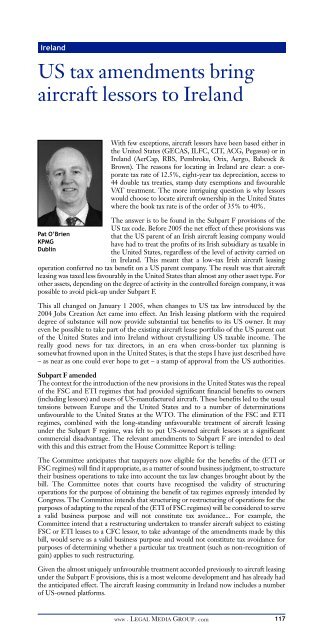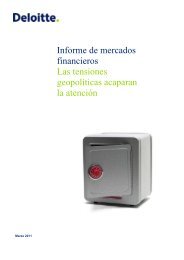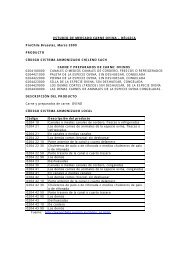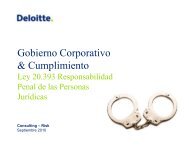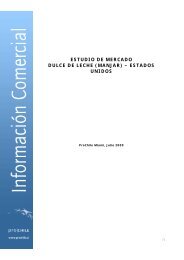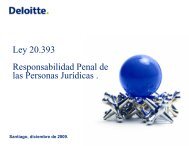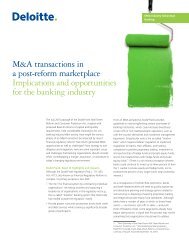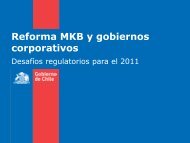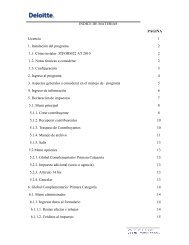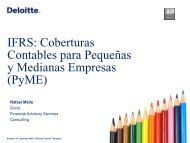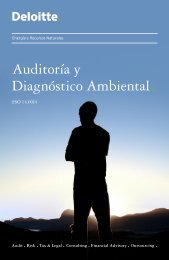Tax Advisers - Deloitte
Tax Advisers - Deloitte
Tax Advisers - Deloitte
Create successful ePaper yourself
Turn your PDF publications into a flip-book with our unique Google optimized e-Paper software.
Ireland<br />
US tax amendments bring<br />
aircraft lessors to Ireland<br />
Pat O’Brien<br />
KPMG<br />
Dublin<br />
With few exceptions, aircraft lessors have been based either in<br />
the United States (GECAS, ILFC, CIT, ACG, Pegasus) or in<br />
Ireland (AerCap, RBS, Pembroke, Orix, Aergo, Babcock &<br />
Brown). The reasons for locating in Ireland are clear: a corporate<br />
tax rate of 12.5%, eight-year tax depreciation, access to<br />
44 double tax treaties, stamp duty exemptions and favourable<br />
VAT treatment. The more intriguing question is why lessors<br />
would choose to locate aircraft ownership in the United States<br />
where the book tax rate is of the order of 35% to 40%.<br />
The answer is to be found in the Subpart F provisions of the<br />
US tax code. Before 2005 the net effect of these provisions was<br />
that the US parent of an Irish aircraft leasing company would<br />
have had to treat the profits of its Irish subsidiary as taxable in<br />
the United States, regardless of the level of activity carried on<br />
in Ireland. This meant that a low-tax Irish aircraft leasing<br />
operation conferred no tax benefit on a US parent company. The result was that aircraft<br />
leasing was taxed less favourably in the United States than almost any other asset type. For<br />
other assets, depending on the degree of activity in the controlled foreign company, it was<br />
possible to avoid pick-up under Subpart F.<br />
This all changed on January 1 2005, when changes to US tax law introduced by the<br />
2004 Jobs Creation Act came into effect. An Irish leasing platform with the required<br />
degree of substance will now provide substantial tax benefits to its US owner. It may<br />
even be possible to take part of the existing aircraft lease portfolio of the US parent out<br />
of the United States and into Ireland without crystallizing US taxable income. The<br />
really good news for tax directors, in an era when cross-border tax planning is<br />
somewhat frowned upon in the United States, is that the steps I have just described have<br />
– as near as one could ever hope to get – a stamp of approval from the US authorities.<br />
Subpart F amended<br />
The context for the introduction of the new provisions in the United States was the repeal<br />
of the FSC and ETI regimes that had provided significant financial benefits to owners<br />
(including lessors) and users of US-manufactured aircraft. These benefits led to the usual<br />
tensions between Europe and the United States and to a number of determinations<br />
unfavourable to the United States at the WTO. The elimination of the FSC and ETI<br />
regimes, combined with the long-standing unfavourable treatment of aircraft leasing<br />
under the Subpart F regime, was felt to put US-owned aircraft lessors at a significant<br />
commercial disadvantage. The relevant amendments to Subpart F are intended to deal<br />
with this and this extract from the House Committee Report is telling:<br />
The Committee anticipates that taxpayers now eligible for the benefits of the (ETI or<br />
FSC regimes) will find it appropriate, as a matter of sound business judgment, to structure<br />
their business operations to take into account the tax law changes brought about by the<br />
bill. The Committee notes that courts have recognised the validity of structuring<br />
operations for the purpose of obtaining the benefit of tax regimes expressly intended by<br />
Congress. The Committee intends that structuring or restructuring of operations for the<br />
purposes of adapting to the repeal of the (ETI of FSC regimes) will be considered to serve<br />
a valid business purpose and will not constitute tax avoidance... For example, the<br />
Committee intend that a restructuring undertaken to transfer aircraft subject to existing<br />
FSC or ETI leases to a CFC lessor, to take advantage of the amendments made by this<br />
bill, would serve as a valid business purpose and would not constitute tax avoidance for<br />
purposes of determining whether a particular tax treatment (such as non-recognition of<br />
gain) applies to such restructuring.<br />
Given the almost uniquely unfavourable treatment accorded previously to aircraft leasing<br />
under the Subpart F provisions, this is a most welcome development and has already had<br />
the anticipated effect. The aircraft leasing community in Ireland now includes a number<br />
of US-owned platforms.<br />
117


